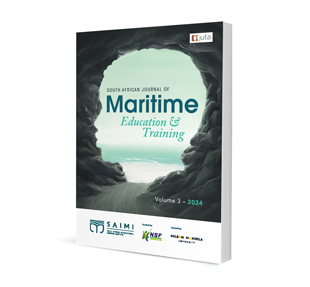
Fostering an Epistemic Shift through Maritime Indigenous and Local Knowledge: A Contribution to Advancing the International Decade of the Sciences for Sustainable Development
Authors: Yonah Ngalaba Seleti and Hashali Hamukuaya
ISSN: 2790-783X
Affiliations: Adjunct Professor, Nelson Mandela University; South African International Maritime Institute; Research Associate, Nelson Mandela University; South African International Maritime Institute
Source: South African Journal of Maritime Education and Training, Volume 3 Issue 1, p. 50-65
https://doi.org/10.47348/SAJMET/2024/i1a5
Share
Cite this article
Yonah Ngalaba Seleti and Hashali Hamukuaya
Fostering an Epistemic Shift through Maritime Indigenous and Local Knowledge: A Contribution to Advancing the International Decade of the Sciences for Sustainable Development
South African Journal of Maritime Education and Training, Volume 3 Issue 1, p. 50-65 https://doi.org/10.47348/SAJMET/2024/i1a5
Abstract
This article examines the transformative potential of indigenous and local knowledge (ILK) within the framework of the International Decade of Sciences for Sustainable Development (IDSSD), as proclaimed by the United Nations General Assembly. By integrating ILK into modern scientific methodologies, the article advocates for an epistemic shift that addresses complex global challenges, particularly in ocean sciences in South Africa. Rooted in indigenous practices and beliefs, ILK offers key insights into environmental stewardship, biodiversity preservation and sustainable resource management. The article underscores the importance of synergistic approaches to knowledge production, emphasising the interplay between ‘knowledge for transformation’ and ‘knowledge of transformation’, as conceptualised by scholars such as Lis Lange and Crain Soudien. Drawing on South African higher education’s transformation paradigms, the article critiques institutional barriers to radical curriculum change while exploring how decoloniality and critical appropriation can foster inclusive and restorative epistemologies. It highlights the role of ILK as a lever for change, addressing issues of exclusion, dignity, recognition, justice and empowerment. Furthermore, the article situates ILK within broader transdisciplinary approaches advocated by the IDSSD, which call for codesigning and coproducing knowledge systems that bridge scientific silos and embrace cognitive justice. The article concludes by envisioning a humanist approach to knowledge appropriation that transcends racebased frameworks and centres African epistemologies. This approach aligns with the IDSSD’s goals to mobilise sciences—including indigenous knowledge systems—toward sustainable development, offering opportunities for epistemic innovation in addressing global challenges such as ocean health and societal well-being.